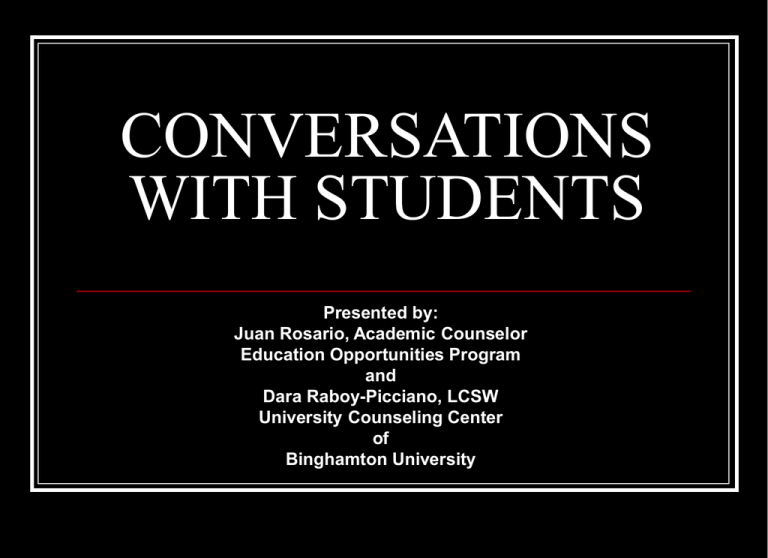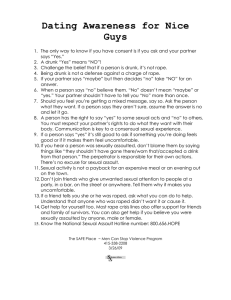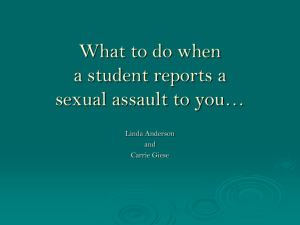
CONVERSATIONS
WITH STUDENTS
Presented by:
Juan Rosario, Academic Counselor
Education Opportunities Program
and
Dara Raboy-Picciano, LCSW
University Counseling Center
of
Binghamton University
BINGHAMTON UNIVERSITY’S SEXUAL
ASSAULT EDUCATION PROGRAM
Gender Specific
Pre-Freshmen/Summer EOP Program
Conception of Program three years ago
Who are Our Students?
Why We do this Program with Our Students
What does the BU Program look like?
BINGHAMTON’S EOP SEXUAL
ASSUALT PREVENTION PROGRAM
THE ATTENDEES:
One-third Latino/Latina American
One-third African American
One-third Asian American
7% Caucasian
90% from inner city and economically
disadvantaged
THE MEN’S PROGRAM
MODEL’S USED:
Definitions of Sexual Assault and Consent based on
models of Bret Sokolow and Alan Berkowitz
Film from Men’s Program at William and Mary based
on John Forbert’s model
Discussion and consent scenarios
Use of Peer Counselors in education who are from
similar cultural and economic backgrounds
Peer counselors provide follow up during summer
program and freshmen year and may be first
responders in the event of an assault
THE WOMEN’S PROGRAM
Definitions of sexual assault and consent based on
Bret Sokolow and Alan Berkowitz work
Film, “The Undetected Rapist” and statistics from
David Lisak, UMASS
Discussion and consent scenarios
Use of Peer Counselors in education who are from
similar cultural and economic backgrounds
Peer counselors provide follow up during summer
program and freshmen year and may be first
responders in the event of an assault
THE REALITY OF
SEXUAL ASSAULT
WOMEN’S RESPONSE:
Only 27% of sexual assault victims
thought of themselves as rape victims
42% who were raped said they had sex
again with the men who assaulted them
42% of raped women said they expect to
be raped again
Statistics from “I Never Called It Rape,” by Robin Warshaw
THE REALITY OF
SEXUAL ASSSAULT
MEN’S RESPONSE:
84% of college men who committed rape said
that what they did was definitely not rape
55% of the men who raped said they had sex
again with their victims
1 in 15 male students reported committing rape
or attempting to commit rape during the
proceeding year
Statistics from “I Never Called It Rape,” by Robin Warshaw
WOMEN OF COLOR AND
SEXUAL ASSAULT
AFRICAN AMERICAN WOMEN:
For every one African American woman who reports her rape, 15 do
not (This # is 1 to 5 for White women) (Bureau of Justice Special
Report, 2003)
40% of Black women report coercive contact of a sexual nature by
the age of 18 (Nat’l Black Women’s Health Project)
Approximately 19% of African American women reported rape in their
lifetime (USDOJ 2006)
44.8% of African American women reported a history of childhood
sexual abuse
More than half of those women (61.5%) reported being raped as
adults (Urquiza and Goodin-Jones, 1994)
WOMEN OF COLOR AND
SEXUAL ASSAULT
ASIAN AND PACIFIC ISLANDER WOMEN:
60% of South Asian women spoke of being forced
to have sex with their husbands against their will
(Abraham. Violence Against Women, Vol. 5 No. 6,
1998)
6.8% of Asian/Pacific Islander women reported
rape in their lifetime (USDOJ, 2006)
Asian/Pacific Islander women are thought to report
at a lower rate than other cultural groups due to
cultural values that discourage disclosure (Women
of Color Network Fact Sheet)
WOMEN OF COLOR AND
SEXUAL ASSAULT
LATINA WOMEN:
21.2% of Latina women are sexually assaulted
which shows no significant difference with the nonLatina women at 22.1% (USDOJ, 2000)
Latina women are more likely to report that a
current or former partner raped them during their
lifetime (Id)
7.9% of Latinas report being raped by spouse,
boyfriend, or ex-boyfriend during their lifetime (Id)
This is 2.2% higher then White women (Id)
WOMEN OF COLOR AND
SEXUAL ASSAULT
NATIVE AMERICAN/ALASKAN INDIAN WOMEN:
1 in 3 Native American/Alaskan Indian women will be raped or
sexually assaulted in her lifetime (Greenfeld, Lawrence A. &
Smith, Steven K. American Indians and Crime DOJ, 1999)
This is 3.5 times higher than for any other race (Id)
34.1% of NA/AI report rape in their lifetime (USDOJ 2006)
90% of Native American women in chemical dependency
treatment are victims of rape and childhood sexual abuse
(Henry, Tribal Responses to Violence Against Women, 1998)
9 in 10 of American Indian victims of sexual assault have
assailants who were White or Black (Greenfeld et al, 1997)
COLLEGE CAMPUSES AND
SEXUAL ASSAULT
85% of rapes on college campuses are
acquaintance rape
42% of college women tell no one about
their assault
Nearly 1/3 of college men said they were
likely to have sex with an unwilling partner
if they thought they could get away with it
Statistics from “I Never Called It Rape”, by Robin Warshaw
THE CONSENT GAME
Scenario 1: consent: one form of sexual
activity to another
Scenario 2: consent and coercion
Scenario 3: consent and incapacitation
Copyright of Binghamton University
CHALLENGING IDEAS AND
FACILITATING CHANGE
Students know definitions from education
programs they have in high school
When given scenarios they don’t apply the
definitions: blaming the victim is prevalent;
protecting the male identity and cultural
definitions of male and female roles
Expecting or accepting a certain amount of
violence in order to survive: “Don’t say ‘no’ so you
won’t get beat up worse,” “there are no
gentlemen where we come from.”
QUESTIONS
AND
COMMENTS


